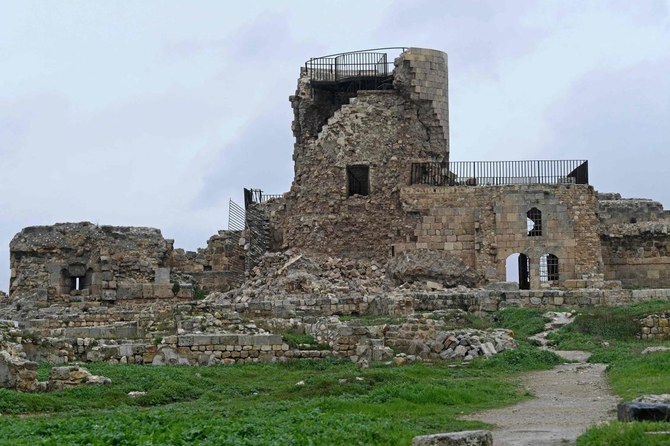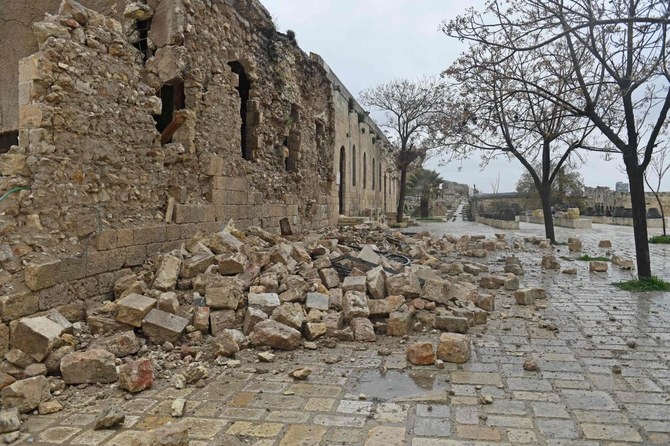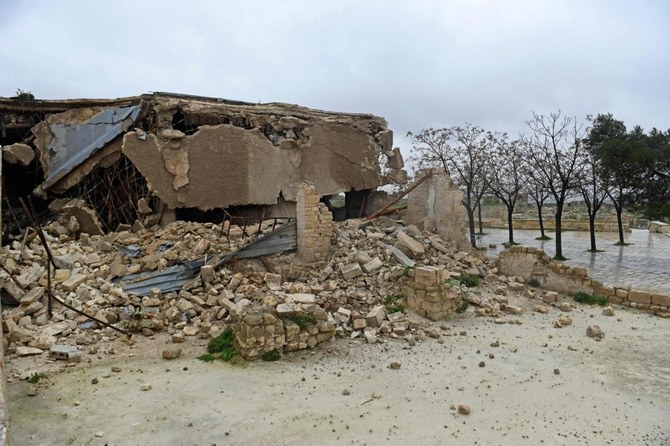DAMASCUS: Several of Syria’s archaeological sites including a famed citadel in the northern city of Aleppo were damaged in a deadly pre-dawn earthquake Monday, the country’s antiquities authority said.
“Parts of the Ottoman mill inside the citadel” of Aleppo have collapsed, while “sections of the northeastern defensive walls have cracked and fallen,” Syria’s Directorate-General of Antiquities and Museums said in a statement.
Parts of the dome of the minaret of the Ayyubid mosque inside the citadel fell off, while the entrance to the fort has been damaged, “including the entrance to the Mamluk tower,” it added, publishing photos of the site on its Facebook page.
More than 1,000 people were killed across Syria as buildings collapsed after the 7.8 magnitude earthquake struck neighboring Turkiye, state media and rescuers said.
At least 156 people died in Aleppo province alone and 507 were injured when 46 buildings collapsed, the official news agency SANA had said, quoting an official.
The city of Aleppo is renowned for its ancient citadel, its UNESCO-listed historic center and its centuries-old covered markets.
Aleppo was Syria’s pre-war commercial hub and considered one of the world’s longest continuously inhabited cities, boasting markets, mosques, caravanserais, and public baths, but a brutal siege imposed on rebels left it disfigured.
Even before the earthquake, buildings in Aleppo often collapsed due to poor infrastructure after more than a decade of war and little oversight to ensure the safety of new construction projects.
In Hama province, archaeological surveys found that “some buildings inside the ancient Al-Marqab Castle” in the city of Baniyas had been damaged, while parts of the fortifications and a tower had fallen, the antiquities body said.
In Tartus province, part of a rocky cliff fell in the vicinity of the Qadmus castle, and residential buildings on the site collapsed, it added.
Expert teams were reportedly assessing the damage, and whether the earthquake had affected the ancient city of Palmyra.
The pre-dawn quake hit near Gaziantep in southeastern Turkiye at a depth of about 18 kilometers (11 miles), the US Geological Survey said.
Tremors were also felt in Lebanon and Cyprus, AFP correspondents said.
Quake damages ancient citadel in Syria’s Aleppo
https://arab.news/9qpc8
Quake damages ancient citadel in Syria’s Aleppo

- “Parts of the Ottoman mill inside the citadel” of Aleppo have collapsed, Syria’s Directorate-General of Antiquities and Museums said
UN: Two million Syrians returned home since Assad’s fall

- The Syrian civil war, which erupted in 2011, displaced half of the population internally or abroad
- But Assad’s December 8 ouster at the hands of Islamist forces sparked hopes of return
The Syrian civil war, which erupted in 2011 with Assad’s brutal repression of anti-government protests, displaced half of the population internally or abroad.
But Assad’s December 8 ouster at the hands of Islamist forces sparked hopes of return.
“Over two million Syrian refugees and displaced have returned home since December,” Grandi wrote on X during a visit to neighboring Lebanon, which hosts about 1.5 million Syrian refugees, according to official estimates.
It is “a sign of hope amid rising regional tensions,” he said.
“This proves that we need political solutions – not another wave of instability and displacement.”
After 14 years of war, many returnees face the reality of finding their homes and property badly damaged or destroyed.
But with the recent lifting of Western sanctions on Syria, new authorities hope for international support to launch reconstruction, which the UN estimates could cost more than $400 billion.
Earlier this month, UNHCR estimated that up to 1.5 million Syrians from abroad and two million internally displaced persons may return by the end of 2025.
‘Very bad decision’ if Hezbollah joins Iran-Israel war, says US official

- US special envoy for Syria Thomas Barrack meets Lebanese officials in Beirut as Iran and Israel trade more strikes
- Hezbollah has condemned Israel’s strikes on Iran and expressed full solidarity with its leadership
BEIRUT: A top US official visiting the Lebanese capital on Thursday discouraged Tehran-backed armed group Hezbollah from intervening in the war between Iran and Israel, saying it would be a “very bad decision.”
US special envoy for Syria Thomas Barrack, who also serves as ambassador to Turkiye, met Lebanese officials in Beirut as Iran and Israel traded more strikes in their days-long war and as the US continues to press Lebanon to disarm Hezbollah.
After meeting Lebanon’s Speaker of Parliament Nabih Berri, a close ally of Hezbollah, Barrack was asked what may happen if Hezbollah joined in the regional conflict.
“I can say on behalf of President (Donald) Trump, which he has been very clear in expressing as has Special Envoy (Steve) Witkoff: that would be a very, very, very bad decision,” Barrack told reporters.
Hezbollah has condemned Israel’s strikes on Iran and expressed full solidarity with its leadership. On Thursday, it said threats against Iran’s Supreme Leader Ayatollah Ali Khamenei would have “dire consequences.”
But the group has stopped short of making explicit threats to intervene. After Israel began strikes on Iran last week, a Hezbollah official told Reuters the group would not launch its own attack on Israel in response.
Hezbollah was left badly weakened from last year’s war with Israel, in which the group’s leadership was gutted, thousands of fighters were killed and strongholds in southern Lebanon and near Beirut were severely damaged.
A US-brokered ceasefire deal which ended that war stipulates that the Lebanese government must ensure there are no arms outside state control.
Barrack also met Lebanese President Joseph Aoun on Thursday and discussed the state’s monopoly on all arms.
Barrack is a private equity executive who has long advised Trump and chaired his inaugural presidential committee in 2016. He was appointed to his role in Turkiye and, in late May, also assumed the position of special envoy to Syria.
Israel strikes Iran’s Arak heavy water reactor, other nuclear sites

- Israeli forces also struck nuclear sites in Bushehr, Isfahan and Natanz, and continue to target additional facilities
DUBAI: Israel has attacked Iran’s Arak heavy water reactor, Iranian state television said Thursday.
The report said there was “no radiation danger whatsoever” and that the facility had already been evacuated before the attack.
Israel had warned earlier it would attack the facility and urged the public to flee the area. The warning came in a social media post on X. It included a satellite image of the plant in a red circle like other warnings that preceded strikes.
The Israeli military said Thursday’s round of airstrikes targeted Tehran and other areas of Iran, without elaborating. It later said Iran fired a new salvo of missiles at Israel and told the public to take shelter.
A military spokesperson later said Israeli forces struck nuclear sites in Bushehr, Isfahan and Natanz, and continue to target additional facilities. Bushehr is Iran’s only operating nuclear power plant, which sits on the Gulf coast.
Israel’s seventh day of airstrikes on Iran came a day after Iran’s supreme leader rejected US calls for surrender and warned that any military involvement by the Americans would cause “irreparable damage to them.” Israel also lifted some restrictions on daily life, suggesting the missile threat from Iran on its territory was easing.
Already, Israel’s campaign has targeted Iran’s enrichment site at Natanz, centrifuge workshops around Tehran and a nuclear site in Isfahan. Its strikes have also killed top generals and nuclear scientists.
A Washington-based Iranian human rights group said at least 639 people, including 263 civilians, have been killed in Iran and more than 1,300 wounded. In retaliation, Iran has fired some 400 missiles and hundreds of drones, killing at least 24 people in Israel and wounding hundreds. Some have hit apartment buildings in central Israel, causing heavy damage.
The Arak heavy water reactor is 250 kilometers southwest of Tehran.
Heavy water helps cool nuclear reactors, but it produces plutonium as a byproduct that can potentially be used in nuclear weapons. That would provide Iran another path to the bomb beyond enriched uranium, should it choose to pursue the weapon.
Iran had agreed under its 2015 nuclear deal with world powers to redesign the facility to relieve proliferation concerns.
In 2019, Iran started up the heavy water reactor’s secondary circuit, which at the time did not violate Tehran’s 2015 nuclear deal with world powers.
Britain at the time was helping Iran redesign the Arak reactor to limit the amount of plutonium it produces, stepping in for the US, which had withdrawn from the project after President Donald Trump’s decision in 2018 to unilaterally withdraw America from the nuclear deal.
The International Atomic Energy Agency, the United Nations’ nuclear watchdog, has been urging Israel not to strike Iranian nuclear sites. IAEA inspectors reportedly last visited Arak on May 14.
Due to restrictions Iran imposed on inspectors, the IAEA has said it lost “continuity of knowledge” about Iran’s heavy water production — meaning it could not absolutely verify Tehran’s production and stockpile.
As part of negotiations around the 2015 deal, Iran agreed to sell off its heavy water to the West to remain in compliance with the accord’s terms. Even the US purchased some 32 tons of heavy water for over $8 million in one deal. That was one issue that drew criticism from opponents to the deal.
Iran confirms meeting European officials on Friday, Iran state media says

DUBAI: Iran’s Foreign Minister Abbas Araqchi confirmed on Thursday he would meet his British, French and German counterparts as well as the European Union’s top diplomat on Friday in Geneva, Iranian state media reported.
He said the meeting had come at the request of the three European states.
Iranian official warns US against involvement in Israel-Iran conflict

- Kazem Gharibabadi: Iran has ‘all the necessary options on the table’
DUBAI: Iran’s deputy foreign minister warned against any direct US involvement in the conflict between Israel and Iran, saying Iran had “all the necessary options on the table,” in comments reported by Iranian state media on Thursday.
“If the US wants to actively intervene in support of Israel, Iran will have no other option but to use its tools to teach aggressors a lesson and defend itself ... our military decision-makers have all necessary options on the table,” Kazem Gharibabadi said, according to state media.
“Our recommendation to the US is to at least stand by if they do not wish to stop Israel’s aggression,” he said.






















